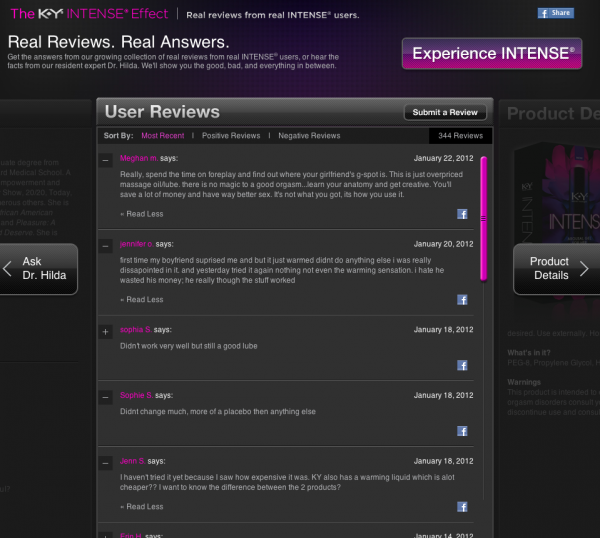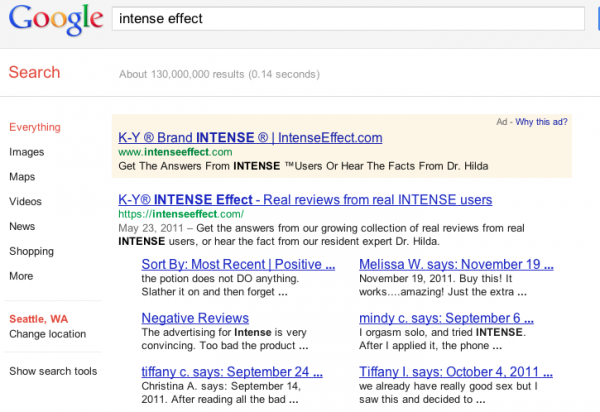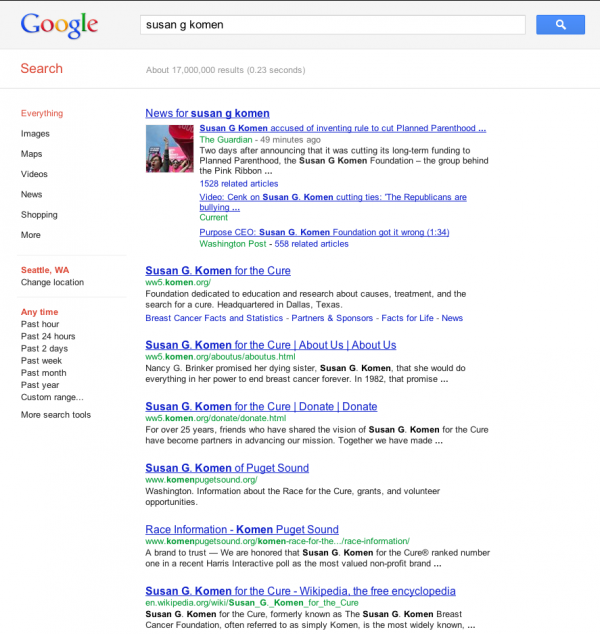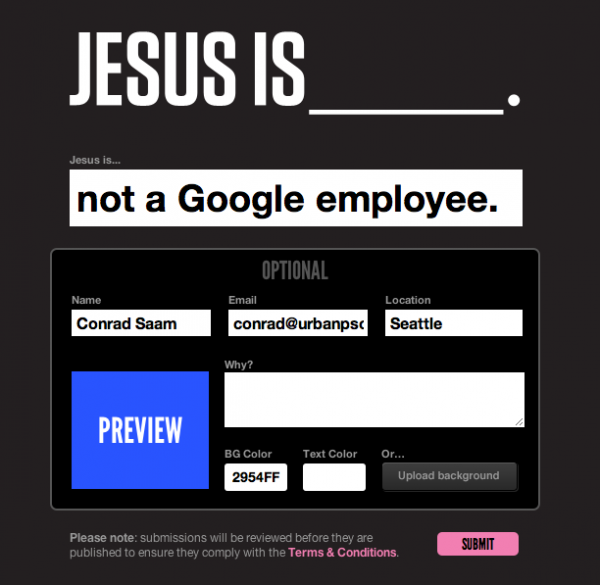UGC + Search Collide: Jesus, Jelly & Susan G. Komen
The first rule of social media marketing is to have a great product. File that rule away while you read on . . . Companies are increasingly integrating user generated content, reviews and social media into their overall marketing initiatives. In principle, this seems like a good idea. In practice, it can falter. I’m going […]
The first rule of social media marketing is to have a great product. File that rule away while you read on . . .
Companies are increasingly integrating user generated content, reviews and social media into their overall marketing initiatives. In principle, this seems like a good idea. In practice, it can falter.
I’m going to review the search implications to proactively (or not) incorporating user generated content into marketing efforts using three unlikely examples: KY Jelly, Susan Komen and Jesus.
Intense Effect – KY From Johnson & Johnson
In recent years, KY brand, owned by Johnson and Johnson, has engaged in a successful brand extension into additional adult products. Their goal is clearly to bring those products generally only available in stores with blacked out windows to the masses. Product packaging is understated. Later night TV spots feature everyday couples expanding their comfort zones. Consumers can pick many products up at traditional retail outlets like drug stores.
Recently, KY introduced KY Intense (a warming lubricant) that was packaged in a tiny potion-like bottle (instead of the traditional clinical white tube that looks like it could hold anything from toothpaste to plumbing caulk and is named “Jelly” which sounds like, well, ewww…) So far, so good.
To support the product, KY launched a series of ads including a clever euphemism spot called nutmeg and even a same sex couples spot. The ads featured everyday couples in their homes, describing how the product vastly improved the woman’s climax.
[youtube]https://www.youtube.com/watch?v=MhRJ8ZsEJgw[/youtube]
Now of course, this is a very big promise – like guaranteeing unicorn sightings or Herman Cain’s reentry to the GOP ticket. The ads end with the following tagline: “scientifically proven to make that big moment feel even bigger”, essentially saying, “if you can’t be satisfied with our product, even PhD’s can’t help you.”
But it gets worse.
Recently, KY launched a social media driven site to support KY Intense with a primary objective of soliciting and sharing user reviews. New ad spots end with a call to action to go to this site, which features a screen sized pop-up of recent product reviews and a call to action to submit your own.
Simple buttons make Facebook sharing easy – although, do I really want to share this w/my mom?
If you are spending millions of dollars to drive people to a site that is full of users reviews, you’d better make sure that you have a great product. Unfortunately, this is where KY Intense falls down.
Five of the five are negative. So you don’t have to squint, I’ll copy some of these down for you:
This is just overpriced massage oil
I was really dissapointed in it. . . i hate he wasted his money; he really thought the stuff worked
Didn’t work very well
Didn’t change much, more of a placebo than anything else
I haven’t tried it yet because I saw how expensive it was. KY also has a warming liquid which is alot cheaper?? I want to know the difference between the 2 products?
As you can see, there are very few truly satisfied customers – in every sense of the word. To their credit, KY offers to expose “the good and the bad and everything in between” about their product, but this is hard with such lofty expectations. With user generated content, when you promise unicorns, you’d better deliver a damn unicorn.
Also worthy of note – the majority of reviews have been positive, but because they are displayed chronologically, the current view looks extremely negative. Even a navigational search for “intense effect” returns pretty negative results directly on the SERP:
And those little sitelinks below? Really want to learn what mindy c. has to say and you’ll land on a completely unbranded, text only page. (The “bad user experience” double entendre jokes keep coming . . . )
Komen Clams Up (In Search)
As a counterpoint to this, consider the recent Susan G. Komen public relations disaster which was driven extraordinarily heavily by social media channels. I was curious to see search results during the PR maelstrom.
The following screenshot was taken on February 2, 2012, at the height of the controversy and with the noted exception of 3 news results, everything on the SERP page was either generic or controlled directly by Komen. Imagine if those Komen pages included metadescriptions of unfiltered user generated content.
Komen’s very very strong search presence combined with a lack of any user generated content in the search results enabled them to manage (at least is search) the PR disaster. (Interestingly, a month after the bruh-ha-ha subsided, I’m showing the last four results on Google’s SERP covering the news.)
(Note: that search results might look differently to you depending on localization.)
Jesus Is . . .
You’ve undoubtedly seen the “Jesus is _______” bumper stickers – white text on a black background designed to make you consider your own approach to religion while you sit in a traffic jam. It’s pretty clever, actually – you’re a captive audience during a time when you can just let your mind wander.
Well, the Jesus is campaign has taken that introspection to the user generated level: I’ve started seeing Jesus is ads popping up on Facebook.
(I know the targeting for this is pretty broad – given a few patriotic like’s and my past working in the legal industry, Facebook thinks I’m either ex-military or a soon-to-be-deported, drunk driving, victim of a pharmaceutical negligence whose wife is leaving him.)
Search results for “jesus is” proactively solicit user generated content submissions:
Now, of course, the very purpose of the “Jesus Is” campaign is to spur introspection. There is probably not a single topic that could have a wider variety of highly impassioned responses. The homepage for Jesus Is is matrix of constantly updating answers to the Jesus Is question:
Jesus is a phony! My Hero? Homophogic Bigotry?
By publishing thoughts across the spectrum, the Jesus Is campaign pushes viewers to not only think about their own perspective, but to understand a wider perspective – and this, I suspect is the ultimate goal of the campaign.
The City Church (the people behind the campaign) won’t just publish any fill-in-the-blank. Note on the submission form below: “submissions will be reviewed before they are published to ensure they comply with the Terms & Conditions.”
My industry joke below will probably never see the light of day, nor will anything completely offensive.
Through this moderated hybrid approach, City Church effectively uses user generated content to push their agenda.
Every company must determine how proactive they are in incorporating user generated content into their search strategy and user experience, but I suspect we will see more and more of this in the near future.
Contributing authors are invited to create content for Search Engine Land and are chosen for their expertise and contribution to the search community. Our contributors work under the oversight of the editorial staff and contributions are checked for quality and relevance to our readers. The opinions they express are their own.
Related stories
New on Search Engine Land







